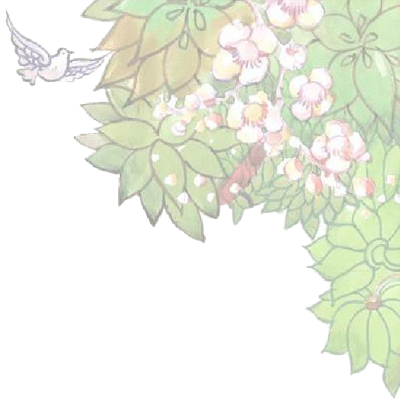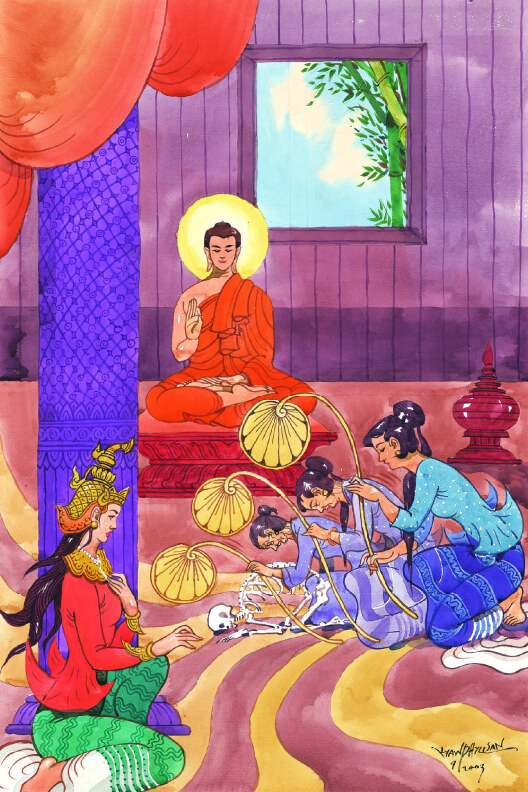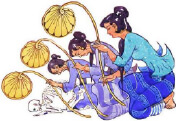39話 美女ケーマー ・・・・ 不浄をさとり、王妃から聖尼へ

第4部 ブッダをめぐる人々
第2章 さまざまな女たち
39話 美女ケーマー ・・・・ 不浄をさとり、王妃から聖尼へ

ゴータマ・ブッダの時代、サーガラ城(訳注:インド西北部の都。後に「ミリンダ王の問い」で知られるギリシア系のミリンダ王の王都となる)のマッダラージャ王に娘がひとりいた。ケーマー(訳注:パーリ語で安穏な女の意味)と呼ばれたが、それは彼女の誕生以来、国がとても平和な状態を経験したからである。美しさで知られていた。肌の色は金色、ハスの花びらのように頬はすべすべで、眼はキラキラ、宝石のようであった。成人してマガダ国のビンビサーラ王の第一王妃となった。ケーマー王妃はみずからの美貌をたいへん誇りにしていたので、うぬぼれて夢中になっている、ご自慢の美貌を世尊が軽んじてやんわり貶したりしないか、と恐れて、世尊のもとへ訪れることを望まなかった。
世尊が竹林(ヴェールヴァナ)精舎に住まわれていたあるとき、ビンビサーラ王は、こう考えた。
「世尊の在家の支援者として、わたしはもっとも名ある者のひとりだが、わが妃のケーマーは世尊のもとを一度も訪ねたことがない。あの尊い方に妃がお目にかかれば、それは善いことであり、妃に役に立つであろう」
そこでビンビサーラ王は竹林精舎のみごとさと、そのたたずまいを賞揚する頌(ほめ)歌をつくらせた。その歌では、竹林(ヴェールヴァナ)精舎が神々の王である帝釈天(サッカ)の歓喜(ナンダ)林(ヴァナ)のように美しい、と表現していた。
精舎の境内には、たくさんの鳥たちがいつも囀りながら飛び交い、
リスが幸せそうに、心おきなく遊んでいる。
季節ごとに、たくさんの花が咲き乱れている・・・。
ケーマー妃がこの歌をきいたとき、精舎の林への興味がわいた。王の許しを得て、妃はお付きの者たちと竹林(ヴェールヴァナ)精舎へ向かった。今朝は世尊が托鉢に出かけている、と妃が見当をつけた日を選んだのである。精舎の林をあてどなく妃は歩き、林の美しさを楽しんだ。木々の木陰の道に沿って歩いたが、そよ風はやさしく、鳥たちは次から次に囀っている。リスがたわむれ、木から木へ跳びはねていた。
しかしながら、いくつかの場所を訪れているあいだに、妃は突然、深く、柔らかく、澄んだ声が講堂からきこえてくるのをきいた。ミツバチが花の蜜の匂いに引き寄せられるように、いや、それより強くその声に引きつけられるように、ケーマー妃は声のする方向へ歩いていった。講堂に入ったとき、妃は世尊を見て、すっかり驚いた。講堂内に坐って、法(ダンマ)を説いていたのである。
ケーマー妃の心の動きを読みとった世尊は、若く美しい女の化身をつくって、脇に立たせ、扇であおがせた。ケーマー妃はその女の姿を見て、たいへん驚いた。自分より美しいのである。妃は、すぐさま柱の後ろに座った。世尊から身を隠すためである。そして、その女の美人ぶりを、あきれるような思いで見つめた。
「おお、眼とまつげは、わたしより、ずっときれいだわ。鼻、くちびる、髪は、まったく申し分なく、完璧。きれいな指をしている手、それに肌の色、すべてすばらしい」と、びっくりした。
しかしながら、ケーマー妃が自分をしのいでとびきり美しい若い女の姿を見ているうちに、若い女から老女へ、みるみる変わっていった。女の美しさはあっけなく衰え、顔には皺が見え始めた。黒髪が白髪まじりに、さらには真っ白になった。ふくよかな美しい頬は落ちこみ、しわくちゃになった。歯がボロボロになったからである。もはや真っ直ぐに立てない。腰が曲がり、とうとう床に倒れ落ちて、死んだ。ケーマー妃はいま起きたばかりの目のあたりにした現象に衝撃を受けた。妃は、こう思った。
「この若く美しい女は、年をとって、美しさのすべてが色褪せ、おしまいには死んでしまった。身体の性質とは、このように朽ち果てるものかしら? それなら、わたしの身体も同じだわ。おお、この身は不浄で、まさにおぞましい。どうしてわたしは、この不浄でおぞましい身体を、うれしく思うことができようか?」
ちょうどそのとき、世尊は妃の心の動きの流れを察知して、妃に次の偈を語りかけた。
“ケーマーよ、この身の集まりを見るがいい、
病んで、不浄で、腐りつつある。
いたるところから汚物が漏れ出し、滲み出ている。
それへの欲情に駆られる者は、愚か者だけ”
“愛欲の奴隷になった者は暴流に流されてゆく。
蜘蛛が、みずからつくった網を滑って、絡まりゆくように。
捨て去った快楽を顧みることもなく” ・・・ (ダンマパダ347)
ありのままの身体について、世尊の法話を聴き、ケーマー妃の心は柔軟になり、うれしくなり、受けいれやすくなった。それを知って、世尊は「大因縁経(マハーニダーナ スッタ)」(長部15)と呼ばれる教えを妃に説かれた。この説法の終わりには、妃は預流(ソーターパッティ)果に達した。
ケーマー妃はそれから宮殿に戻り、ただちに夫のビンビサーラ王のもとへ行った。そして比丘尼の僧団に入団することを認めてくれるように、と求めた。ビンビサーラ王は額のところまで両手を挙げ、合掌して、妃に言った。
「わがいとしい妃よ、比丘尼になることを許そう。そなたの出家で、解脱がかないますように」
半月後、布薩(ウポーサタ)(訳注:同一地域の比丘・比丘尼が毎月二回、新月と満月の日に集まり、戒を誦し、互いに反省し、罪過を懺悔する行事)の儀式のあいだに、ケーマー尊者は目の前にある灯油明かりの炎のゆらめきを見て、炎がどのように明滅するか、を観察した。そのとき彼女は、炎の生滅の性質にはたらかせた洞察のひらめきを、条件づけられたすべての現象に通達させた。これを行うことによって、彼女は、無常といのちの不満足(苦)をさとり、四無碍解智(パティサンビダー ニャーナ)(訳注:むげげち、義・法・詞・弁の四つに精通した智慧)と六神通(アビンニャー)(神足通、天耳通、他心通、宿命通、天眼通、漏尽通)の阿羅漢に達した。
比丘尼の仏弟子中、ケーマー尊者は大慧第一である。ちょうど比丘僧団の中の仏弟子中、サーリプッタ尊者とモッガラーナ尊者が世尊によって二大弟子に指名されたように、ケーマー尊者とウッパラヴァンナー(蓮華色)尊者は比丘尼僧団の仏弟子中、二大弟子に指名されている。
※ 画像やテキストの無断使用はご遠慮ください。/ All rights reserved.

Episode 39. Khemā, THE FIRST CHIEF Bhikkhunī DISCIPLE
During the time of the Buddha Gotama, King Maddarāja of Sāgala had a daughter. She was named Khemā because ever since her birth, the country had been experiencing a high state of peacefulness. She was well known for her beauty; her complexion was of golden colour; her cheeks were as smooth as lotus petals; and her eyes sparkled like
gems. When she came of age, she became one of the chief consorts of King Bimbisāra of Magadha. Queen Khemā was so proud of her physical beauty that she did not want to visit the Blessed One lest He should speak disparagingly of her beauty with which she was infatuated.
On one occasion, when the Blessed One was residing at the Veḷuvana Monastery in Rājagaha, King Bimbisāra thought: “I’m one of the most prominent lay supporters of the Blessed One, but my queen, Khemā, has never visited Him. It would be good and beneficial for her if she met the Lord.” Then, King Bimbisāra had a song composed in praise of the beauty of the Veḷuvana Monastery and its surroundings. The song described that the Veḷuvana Monastery was as beautiful as the Nandavana Garden of Sakka, the king of devas. In the monastery area, there lived many kinds of birds always singing back and forth;
squirrels played happily and harmoniously; so did many kinds of flowers bloom in every season.
When Queen Khemā heard that song, her interest in the grove was aroused. With the king’s permission, she went to the Veḷuvana Monastery with her attendants. She chose the one morning when she presumed the Blessed One was collecting alms. She wandered about and enjoyed the beauty of the grove. She walked along the path under the shade of the trees, with the wind blowing softly, birds singing one
after another, and squirrels playing and jumping from one tree to another.
However, while visiting some of the rooms, she suddenly heard a deep,
soft, clear voice coming from the preaching hall. As a bee was attracted by the smell of flower’s honey, even so the voice was so attracting that Queen Khemā just walked to where the voice came from. When she entered the hall, she was quite surprised that she should see the Blessed One, who was sitting inside the hall and preaching the Dhamma.
The Blessed One, who read Queen Khemā’s thought, then created an image of a beautiful young lady, standing aside and fanning Him. Queen Khemā was very surprised to see the lady whose beauty surpassed her own. Then, she immediately sat down behind a pillar to cover herself from the Blessed One and gazed on her in admiration of her beauty. She was amazed: “Oh, her eyes and her eyelashes are more beautiful than mine; her nose, her lips, and her hair are so perfect; her hands with
the beautiful fingers and her complexion, all are excellent.”
But then, as Queen Khemā looked at the young lady whose extraordinary beauty far excelled her own, she saw her gradually growing from youth to old age. Her beauty was fading; wrinkles appeared on her face; her black hair turned grey, and then white; her beautiful cheeks were sunken as her teeth decayed. She could not stand upright any longer; she became hunchbacked; finally she fell on the floor and died. Queen Khemā was shocked seeing the phenomenon which had just happened. She
thought: “This beautiful young lady grew old and all her beauty was fading and at last she died. Is the nature of the body wrecked like that? Then, so will my body. O, this body is impure, it is indeed loathsome. How can I relish this impure and loathsome body?”
Thereupon, the Blessed One gave her a Dhamma talk which made her mind
pliable, delighted and receptive. Knowing this, the Blessed One continued preaching a discourse called the Mahānidāna Sutta to her. At the end of the discourse, she attained the Fruition of Sotāpatti.
Queen Khemā then returned to the palace—where she immediately approached her husband, King Bimbisāra—and asked for his consent to enter the Order of Bhikkhunīs. King Bimbisāra with his joined palms raised to his forehead said to his queen: “My dear queen, I allow you to become a Bhikkhunī. May your renunciation come to its fulfilment.”
About half a month later, during the Uposatha ceremony, the Venerable
Khemā contemplated on the flickering flame of the oil lamp in front of her, how the flame arose and how it disappeared. Then, she applied the insight into the nature of the rise and fall of the flame to all conditioned things. By doing this, she realised the impermanence and dissatisfaction of life and attained Arahantship.
Among the bhikkhunī disciples, the Venerable Khemā is the foremost in
wisdom (mahāpaññānaṁ aggā). Just as the Venerable Sāriputta and the
Venerable Moggallāna were appointed by the Blessed One as His chief bhikkhu disciples in the Order of Bhikkhus, so were the Venerable Khemā and the Venerable Uppalavaṇṇā appointed as the two chief bhikkhunī disciples in the Order of bhikkhunīs.
※ 画像やテキストの無断使用はご遠慮ください。/ All rights reserved.
アシン・クサラダンマ長老
1966年11月21日、インドネシア中部のジャワ州テマングン生まれ。中国系インドネシア人。テマングンは近くに3000メートル級の山々が聳え、山々に囲まれた小さな町。世界遺産のボロブドゥール寺院やディエン高原など観光地にも2,3時間で行ける比較的涼しい土地という。インドネシア・バンドゥンのパラヤンガン大学経済学部(経営学専攻)卒業後、首都ジャカルタのプラセトエイヤ・モレヤ経済ビジネス・スクールで財政学を修め、修士号を取得して卒業後、2年弱、民間企業勤務。1998年インドネシア・テーラワーダ(上座)仏教サンガで沙弥出家し、見習い僧に。詳しく見る
奥田 昭則
1949年徳島県生まれ。日本テーラワーダ仏教協会会員。東京大学仏文科卒。毎日新聞記者として奈良、広島、神戸の各支局、大阪本社の社会部、学芸部、神戸支局編集委員などを経て大阪本社編集局編集委員。1982年の1年間米国の地方紙で研修遊学。2017年ミャンマーに渡り、比丘出家。詳しく見る

※ 画像やテキストの無断使用はご遠慮ください。
All rights reserved.

